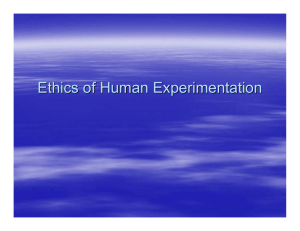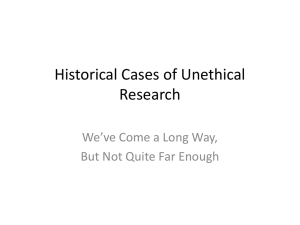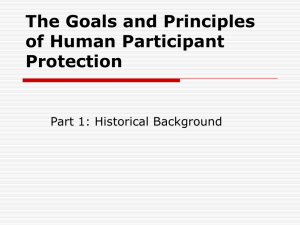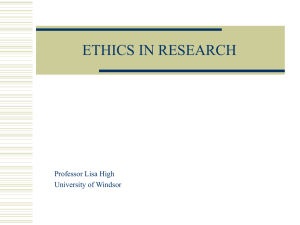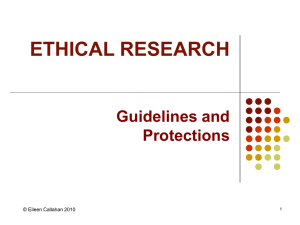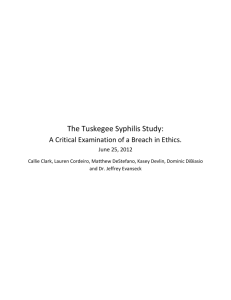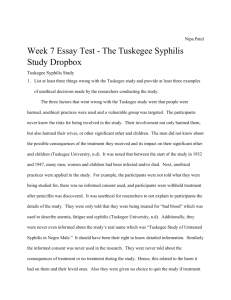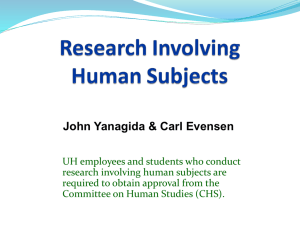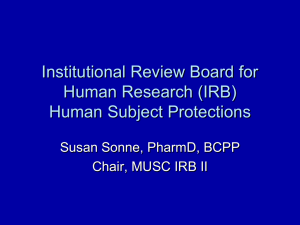Document
advertisement
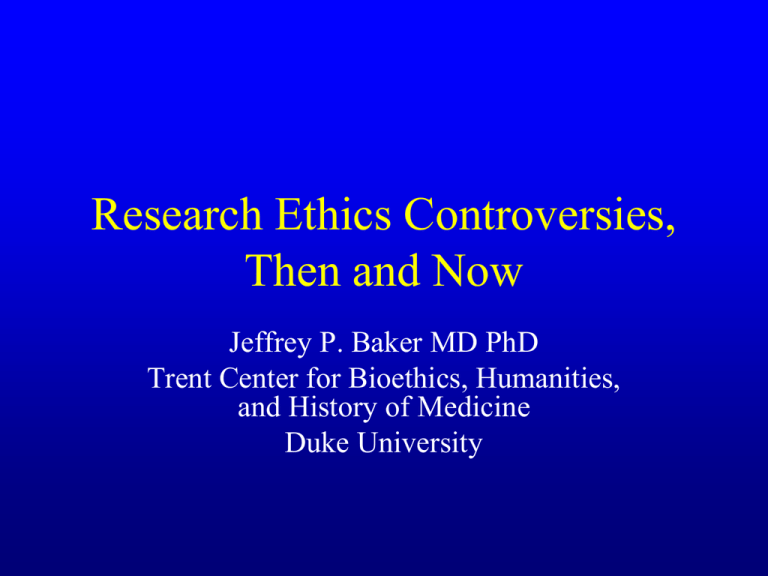
Research Ethics Controversies, Then and Now Jeffrey P. Baker MD PhD Trent Center for Bioethics, Humanities, and History of Medicine Duke University Objectives • Briefly review the history of research ethics in the United States • Examine several controversies in more detail – – – – Fernald School radiation studies Sloan Kettering cancer cell infusion studies Willowbrook hepatitis studies Tuskegee and the Guatemala syphilis studies Edward Jenner and Smallpox Vaccine • Observations re: cowpox • Inoculated 1 yo son • Then inoculated 8 yo James Phipps Jenner’s Experiment • “The more accurately to observe the progress of the infection, I selected a healthy boy, about 8 years old, for the purpose of inoculation for the cow-pox. The matter was inserted into the arm of the boy by the means of two incisions.” What were the ethical norms for human subject research in 1796? Hippocratic Oath “I will use my power to help the sick to the best of my ability and judgment; I will abstain from harming or wronging any man by it” Does not directly address human experimentation… but might permit it so long as risks minimal and outweighed by potential benefit Rise of Laboratory Medicine • Rise of germ theory and laboratory science introduces many new potential therapies by late 1800s • At some point had to be tested in humans Research Ethics: Claude Bernard (1865) “Among the experiments that may be tried on man, those that can only harm are forbidden, those that are innocent are permissible, and those that may do good are obligatory” William Osler (1907) • Hopkins faculty • Perhaps most famous physician in America • Once animal experiments established safety, physicians who obtained “full consent” could introduce new therapies “We have no right to use patients entrusted to our care for the purpose of experimentation unless direct benefit to the individual is likely to follow” Consent: Another View • “In practical work in medical wards, the patients do virtually give their consent to what is done to them, and if they raise any objection, the procedure is not carried out” --Francis Peabody, Harvard physician --Letter to Walter Cannon, 1916 U.S. Research Ethics before WWII: Summary • Focus on “lesser harms” reasoning rather than consent: intervention justified only if risk it entails are lower than risks of natural disease it is intended to prevent or treat • Patient safety depended upon professional norms, not legal regulation Nuremberg: The Doctors Trial (1946) The Defense: Ethical Relativism Malaria Experiments • Human trials in Illinois penitentiary • Prisoners inoculated with malarial mosquitoes • Praised in Life Magazine as heroes.. The Verdicts • Trial completed August 20, 1947 • 15 of 23 defendants found guilty • 7 sentenced to hanging, 5 to life imprisonment The Nuremberg Code (1946) • 10 basic principles that must be observed in order for human experimentation to be ethical • First principle: The voluntary consent of the human subject is absolutely essential. Henry Beecher, “Ethics in Clinical Research,” NEJM 1966 • Summarized 22 studies from prestigious medical journals in which researchers provided no indication of having explained risks to patients • Included: invasive procedures, adults infused with cancer cells, institutionalized children deliberately exposed to hepatitis Tuskegee Syphilis Study: 1932-1972 • 40 year study of “untreated syphilis in the male Negro” • Exposed in 1972 • Public outcry and government commission The Belmont Report (1974): Central Bioethical Principles • Respect for Autonomy: protect patient’s right to informed consent • Beneficence/Nonmaleficence: physician’s duty to help and not harm the patient • Justice: Burden of risks and benefits should not fall disproportionately on those most vulnerable The Common Rule 1981 • Codified principles of Belmont Report into law • Revised, but remains the central body of regulations protecting human subjects • Reliance on informed consent and review by institutional review boards (IRBs) History of Research Ethics: Summary • Before WWII: Subject to professional norms and practices (emphasizing lesser harms over consent) • Nuremberg Code articulates informed consent: 1946 • Tuskegee scandal triggers public outcry and regulation: 1972-81 Cases Deceptions The Fernald School The Fernald School Radioisotope Studies • Researchers by MIT working with school staff carried out nontherapeutic experiments in nutrition from 1946 though 1953 • Involved low dose radiation • Parents not informed The Science Club Students from the Fernald School, 1954 Letter to parents, May 1953 • “We have asked for volunteers to give a sample of blood once a month for three months, and your son has agreed to volunteer because the boys who belong to the Science Club have many additional privileges.” What are the ethical problems? • • • • Harm? Exposure was very low Deception Using humans as a means to an end Taking advantage of a vulnerable population Betrayal of Trust Brooklyn, New York 1963 Jewish Chronic Disease Hospital • Lawsuit: 22 terminally ill patients had been given infusions of cancer cells without their knowledge Sloan Kettering Cancer Study (Dr Chester Southam, 1954-63) • Purpose: Determine if cancer patients lacked immune response to cancer cells • Inoculated cancer cells in cancer patients and healthy controls (prisoners); found that the latter cleared the cancer faster • Did this reflect cancer or poor health? • Recruited 22 terminally ill controls (JCDH)—without consent! Questions: Ethical and Psychological • Again raises the same issues as the Fernald school: deception, exploitation • This case is interesting as a case study in moral psychology: how did a respected physician get to this point? Dr. Southam, Interview, 1964 •• “The reason we did not tell them was for their sake, not ours. The cancer patients at Memorial Hospital seem to develop a bizarre, defensive reaction against the knowledge they have cancer…” • An Irony • Between the Nuremberg Code (1946) and the exposure of Tuskegee (1972), medical investigators were more likely to obtain consent from prisoners than patients • The Nuremberg code was seen as applying to healthy volunteers, not patients “One of the real ludicrous aspects of talking about a prisoner being a captive, and therefore needing more protection than others, is that there’s nobody more captive than a sick person” From oral history interview, Dr Thomas Chalmers Recent Parallels: Jesse Gelsinger • 18 yo who died in 1999 gene therapy experiment • ?whether consent was adequate • Allegations of conflict of interest for Univ of Penn researchers Experiments in Nature The Willowbrook Hepatitis Studies Staten Island, New Jersey, 1955-1972 Dr Saul Krugman Context • Extreme overcrowding • Krugman found that infection with hepatitis was virtually inevitable…yet mild in children The Studies • Decided to deliberately expose some children in order to learn more of natural history of hepatitis and thereby control it • Researchers believed that the strain was very benign in children, and might protect against others • The studied did in fact lead to important knowledge (and first hepatitis B vaccine) Exposure and Lawsuits: 1968-72 Geraldo Rivera Patients Were parents fully informed? • Lawsuit launched in early 1970s claimed children entered into study without consent • In fact, there was an elaborate process of consent involving group meetings and written consent for all participants • Controversy reflected the context of the times (1968-72) Was the study justifiable as a “study of nature”? • Krugman argued that children were going to be infected either way; his study was justified morally as a way to help control the infection • Critics charged that the researchers should never have collaborated with an institution under such conditions • The question was further charged by the exposure of the Tuskegee study… A Recent Parallel: Baltimore Lead Abatement Study • Hopkins researchers studied whether less expensive forms of lead abatement were as effective • Researchers worked with landlords to recruit families with children • ?consent Syphilis Studies: Tuskegeee and Guatemala Tuskegee • President Clinton’s apology • Most famous of all research scandals in US history • Remembered.. But how accurately? The Lessons of Tuskegee • Violated all three of the basic principles of ethical research: – Decepttion and failure to obtain consent – Posing harm to the patient (at least potentially) – Research in a vulnerable populatoin • Also raises issues of race and gender Tuskegee’s Legacy • Far more than the other examples, the memory of Tuskegee has persisted– in the African-American community • Often cited as reasons to distrust researchers • And an example of memory becoming mythology: widespread belief that subjects were deliberately infected with syphilis Headlines: 8 June 2011 Guatemala Victims of US Syphilis Study still haunted by the ‘devil’s experiment” The Guardian “ Dr John Cutler • Died in 2003 • Former Assist Surgeon General and Deputy Director of Pan American Sanitary Bureau • And a Tuskegee doctor Cutler in Alabama, 1960s Cutler in Guatemala: 1946-48 • PHS had long history of int’l work, especially via Pan American Sanitary Bureau • Close cooperation with Guatemala Context: The Soldiers Return– with STDs? • Was immediate penicillin sufficient? • Could there be a better chemical prophylactic? • 2 years of studies Prison Studies • Prostitutes with syphilis were allowed to provide services to inmates at Guatemala City’s Central Penitentiary, paid for by PHS funds • Different chemical prophylaxis techniques applied • If subject developed syphilis, was given penicillin Orphanage Studies • Researcher recruited 438 children in national orphanage to study value of different blood tests • Not inoculated with syphilis Asylum for Mentally Ill • The PHS cooperated with the institution, not the subjects or families • Introduced syphilis via infected prostitutes • But also through deliberate inoculation via abrasion • Anyone infected was given penicillin Was anyone harmed? • Records reviewed so far suggest 696 subjects were exposed to syphilis • Preliminary recent analysis suggests 14% of those with syphilis may not have received adequate treatment Response and Apology Reasons to study this history • Lessons for formulating policy • Understanding motivations: why physicians did actions we consider unethical • And to grapple the question of whether we can judge the past. Can we judge the past? Objections • Cultural Ethical Relativism: we can only make moral judgments with respect to cultural context • Culturally Induced Ignorance: we cannot condemn individuals for not escaping ignorance of relevant knowledge (ie, risks) or shared enculturated beliefs (ie, no one condemned the practice)
